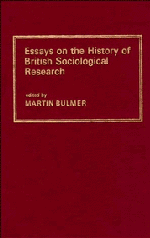Book contents
- Frontmatter
- Contents
- Preface
- Contributors
- Introduction
- History
- 2 Social monitors: population censuses as social surveys
- 3 The emergence of the sociological survey, 1887–1939
- 4 Durkheim, Booth and Yule: the non-diffusion of an intellectual innovation
- 5 The Government Social Survey
- 6 Methodological research on sample surveys: A review of developments in Britain
- 7 Mass-Observation 1937–1949
- 8 The Institute of Community Studies
- 9 Provincials and professionals: the British post-war sociologists
- 10 On the eve: a prospect in retrospect
- Use
- Index
6 - Methodological research on sample surveys: A review of developments in Britain
Published online by Cambridge University Press: 12 November 2009
- Frontmatter
- Contents
- Preface
- Contributors
- Introduction
- History
- 2 Social monitors: population censuses as social surveys
- 3 The emergence of the sociological survey, 1887–1939
- 4 Durkheim, Booth and Yule: the non-diffusion of an intellectual innovation
- 5 The Government Social Survey
- 6 Methodological research on sample surveys: A review of developments in Britain
- 7 Mass-Observation 1937–1949
- 8 The Institute of Community Studies
- 9 Provincials and professionals: the British post-war sociologists
- 10 On the eve: a prospect in retrospect
- Use
- Index
Summary
Survey research methods are now widely used in Britain; survey agencies have a well established survey methodology; the standards of survey research interviewing, sampling, coding, and other procedures are high. Yet much of the methodology is based on conventional wisdom and ease of operational performance. Have we done enough to test the methodology and to review alternatives? This chapter examines the evolution of survey methods in Britain and identifies contributions to methodological research of survey practitioners, academics and survey users. It discusses the conditions required for effective methodological research and shows how organisational and financial factors have inhibited those conditions in Britain.
The expansion of survey research
Since the 1950s there has been a considerable increase in the use of survey research to assist social policy, to describe and explain social conditions, to aid production, marketing and advertising decisions, to improve civic planning and to help develop and test economic, social and psychological theories. The Market Research Society, for example, has grown rapidly: from 114 members in 1953 to 1,300 by 1963, 2,500 by 1973 and 4,000 by 1983. The growth in membership reflects the growth in the market and opinion research industry as a whole, much of which is based on survey research. Commissioned survey work has been estimated as growing from about £3m annually in the mid 1950s to well over £100m today. Even allowing for changes in the value of money, that represents a considerable expansion.
- Type
- Chapter
- Information
- Essays on the History of British Sociological Research , pp. 101 - 120Publisher: Cambridge University PressPrint publication year: 1985



